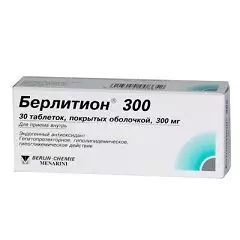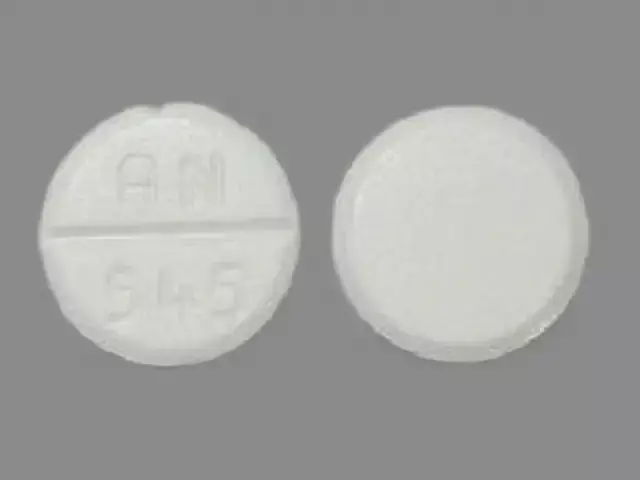- Author Rachel Wainwright [email protected].
- Public 2023-12-15 07:39.
- Last modified 2025-11-02 20:14.
Berlition 300
Berlition 300: instructions for use and reviews
- 1. Release form and composition
- 2. Pharmacological properties
- 3. Indications for use
- 4. Contraindications
- 5. Method of application and dosage
- 6. Side effects
- 7. Overdose
- 8. Special instructions
- 9. Application during pregnancy and lactation
- 10. Use in childhood
- 11. Drug interactions
- 12. Analogs
- 13. Terms and conditions of storage
- 14. Terms of dispensing from pharmacies
- 15. Reviews
- 16. Price in pharmacies
Latin name: Berlithion 300
ATX code: A16AX01
Active ingredient: Thioctic acid (Thioctic acid)
Producer: Jenahexal Pharma, EVER Pharma Jena GmbH, Haupt Pharma Wolfratshausen (Germany)
Description and photo update: 2018-22-10
Prices in pharmacies: from 496 rubles.
Buy

Berlition 300 is a metabolic agent.
Release form and composition
- concentrate for preparation of solution for infusion: clear solution of greenish-yellow color [12 ml each in dark glass ampoules with a break line (white ring) in the upper part of the ampoule, 5, 10 or 20 pcs. in contour cardboard packages (trays), in a cardboard bundle 1 package];
- film-coated tablets: round, biconvex, scored on one side, pale yellow; the cross section shows an uneven granular light yellow surface [10 pcs. in blisters, in a cardboard box 3, 6 or 10 blisters].
The active substance of the drug: ethylenediamine salt of thioctic (α-lipoic) acid, 1 tablet and 1 ampoule of concentrate in terms of thioctic acid contains 300 mg.
Concentrate excipients: propylene glycol, ethylenediamine, water for injection.
Additional components of the tablets:
- excipients: croscarmellose sodium, magnesium stearate, povidone (K = 30), lactose monohydrate, microcrystalline cellulose, colloidal silicon dioxide;
- film shell: liquid paraffin and Opadray OY-S-22898 yellow, containing sodium lauryl sulfate, titanium dioxide (E 171), hypromellose, liquid paraffin, sunset yellow dyes and quinoline yellow (E 104).
Pharmacological properties
Pharmacodynamics
Thioctic acid is a coenzyme of the decarboxylation reactions of α-keto acids. It is an endogenous antioxidant of direct and indirect action (binds free radicals). Protects cells from damage by decay products, increases the physiological content of the antioxidant glutathione, improves endoneural blood flow and microcirculation. Participates in the regulation of lipid and carbohydrate metabolism, increases the concentration of glycogen in the liver, stimulates cholesterol metabolism. In diabetes mellitus, it reduces the formation of end products of progressive glycosylation of proteins in nerve cells, reduces the concentration of glucose in the blood plasma and insulin resistance, affects the alternative metabolism of glucose, reduces the accumulation of pathological metabolites in the form of polyols, thereby reducing the edema of the nervous tissue. Taking part in the metabolism of fats, α-lipoic acid increases the biosynthesis of phospholipids (in particular, phosphoinosite) and thereby improves the damaged structure of cell membranes.
Thioctic acid eliminates the toxic effects of pyruvic acid and acetaldehyde (alcohol metabolites), normalizes the conduction of nerve impulses and energy metabolism, reduces the excessive formation of free oxygen radicals, endoneural hypoxia and ischemia, thereby weakening such manifestations of polyneuropathy as paresthesias, numbness, pain and burning sensation in limbs.
Thus, the drug improves lipid metabolism, has antioxidant, hypoglycemic and neurotrophic effects.
The active substance, used in the form of the ethylenediamine salt, reduces the severity of possible side effects inherent in thioctic acid.
Pharmacokinetics
With intravenous administration of α-lipoic acid at a dose of 600 mg, the maximum plasma concentration is approximately 20 μg / ml and is noted after 30 minutes.
When taken orally tablets Berlition 300 thioctic acid is rapidly absorbed from the gastrointestinal tract. The maximum concentration in blood plasma reaches within 25-60 minutes. Absolute bioavailability - 30%. The volume of distribution is about 450 ml / kg. Absorption decreases with food intake.
The drug has a "first pass" effect through the liver. As a result of conjugation and side chain oxidation, metabolites are formed. The total plasma clearance is 10-15 ml / min / kg. It is excreted mainly by the kidneys (from 80 to 90%) in the form of metabolites. The half-life (T 1/2) is up to 25 minutes.
Indications for use
Berlition 300 is used to treat diabetic and alcoholic polyneuropathy.
Contraindications
- age up to 18 years;
- pregnancy and lactation;
- hypersensitivity to any component of the drug.
In the form of tablets, Berlition 300 is also contraindicated in lactase deficiency, hereditary lactose intolerance and glucose-galactose malabsorption syndrome.
Instructions for the use of Berlition 300: method and dosage
Concentrate for solution for infusion
The solution prepared from the concentrate is injected slowly (for at least 30 minutes) intravenously in a drip in a daily dose of 300-600 mg (1-2 ampoules) for a course of 2-4 weeks. Then the patient is transferred to the tablet form of the drug and 1-2 tablets are prescribed per day.
The duration of the general course of treatment and the need to repeat it, the doctor determines individually.
The solution for intravenous administration is prepared immediately before use. To do this, the contents of 1-2 ampoules are diluted in 250 ml of 0.9% sodium chloride solution. Thioctic acid is sensitive to light, so the prepared solution should be protected from it, for example, using aluminum foil. In a dark place, the dissolved concentrate can be stored for no more than 6 hours.
Film-coated tablets
Berlition 300 tablets should be taken orally 1 time per day 30 minutes before meals, swallowing them whole and drinking plenty of liquid.
Adults are usually prescribed 600 mg (2 tablets).
The duration of therapy and the need for repeated courses are determined by the doctor individually. The drug can be used for a long time.
Side effects
Berlition 300 is generally well tolerated. Very rarely (<1/10000, including isolated cases), the following adverse reactions are noted:
- from the immune system: allergic reactions (skin rash, itching, urticaria), anaphylactic shock;
- from hemostasis: thrombocytopathy, purpura;
- from the nervous system: diplopia, disturbance or change in taste, convulsions;
- from the side of metabolism: a decrease in the level of glucose in the blood plasma, symptoms of a hypoglycemic state (dizziness, headache, blurred vision, sweating).
Taking the pills is also likely to cause gastrointestinal side effects such as diarrhea, abdominal pain, nausea and vomiting.
With intravenous administration of Berlition 300 in very rare cases, in addition, local reactions (burning sensation) are possible. With the rapid introduction of the drug, intracranial pressure may increase (manifested by a feeling of heaviness in the head), and difficulty in breathing is possible.
Overdose
In case of an overdose, headache, nausea and vomiting may occur.
In severe cases (when taking thioctic acid at a dose of more than 80 mg / kg), the following are possible: severe violations of acid-base balance, lactic acidosis, clouding of consciousness or psychomotor agitation, disseminated intravascular coagulation syndrome, acute skeletal muscle necrosis, generalized convulsions, hemolysis, multiple organ failure, suppression of bone marrow activity, hypoglycemia (up to the development of coma).
If severe intoxication is suspected, emergency hospitalization is recommended. First, they carry out general measures necessary for accidental poisoning: induce vomiting, wash the stomach, prescribe activated charcoal, etc. Treatment of lactic acidosis, generalized seizures and other potentially life-threatening consequences of intoxication is symptomatic, carried out in accordance with the basic principles of modern intensive care.
There is no specific antidote. Filtration methods with forced excretion of thioctic acid, hemoperfusion and hemodialysis are not effective.
special instructions
With intravenous administration of the drug, hypersensitivity reactions may develop. In the event of symptoms such as itching, malaise, nausea, Berlition 300 should be canceled immediately.
Alcohol reduces the effectiveness of thioctic acid, therefore, during the period of treatment and, if possible, in between courses, one should refrain from drinking alcohol.
The solution prepared from the lyophilisate must be protected from light.
In diabetic patients receiving oral hypoglycemic drugs or insulin, the plasma glucose level should be constantly monitored, especially at the beginning of treatment with Berlition 300. If necessary, their dose should be adjusted to avoid the development of hypoglycemia.
Influence on the ability to drive vehicles and complex mechanisms
Special studies on the effect of thioctic acid on the ability to drive complex mechanisms and vehicles have not been carried out, so it is recommended to exercise caution when engaging in activities with potentially dangerous consequences.
Application during pregnancy and lactation
In clinical studies of reproductive toxicity, no risks were identified with respect to fertility, embryotoxic properties of the drug and its effect on fetal development. However, there is not enough clinical experience with the use of thioctic acid in this category of patients, therefore, the appointment of Berlition 300 during pregnancy is contraindicated.
It is not known whether thioctic acid penetrates into the mother's milk, and therefore the drug is contraindicated also during lactation.
Pediatric use
According to the instructions, Berlition 300 is not prescribed for children and adolescents under 18 years old, since there is no experience of its use in this age category of patients.
Drug interactions
Thioctic acid can form chelate complexes with metals; its simultaneous use with iron and magnesium preparations, as well as the use of dairy products (since they contain calcium), are not recommended. If necessary, their combined purpose should be observed at least 2-hour intervals between doses.
Berlition 300 reduces the effectiveness of cisplatin.
The effectiveness of thioctic acid is reduced by ethanol.
The drug enhances the effect of insulin and oral hypoglycemic agents when taken simultaneously.
Thioctic acid in combination with sugar molecules forms poorly soluble complex compounds, therefore, due to incompatibility, Berlition 300 cannot be used in combination with solutions with disulfide bonds, Ringer's solutions, dextrose, glucose and fructose, and solutions that react with SH-groups.
Analogs
Berlition 300 analogs are: for tablets - Lipoic acid, Thiolepta, Tiogamma, Thioctacid BV; for concentrate - Berlition 600, Neurolipon, Octolipen, Tiogamma.
Terms and conditions of storage
Storage conditions: place out of the reach of children, protected from light, with a temperature up to 25 ° C. The concentrate must not be frozen.
The shelf life of the concentrate is 3 years, after dilution with saline - 6 hours in a dark place. The tablets can be stored for 2 years.
Terms of dispensing from pharmacies
Dispensed by prescription.
Reviews about Berlition 300
The drug is often prescribed for diabetes mellitus and liver pathologies. Most of the reviews about Berlition 300 are positive, both among doctors and among patients who were treated. The drug is characterized as effective and practically free of side effects. However, it should only be prescribed by an appropriate medical specialist if there is an indication for use.
Price for Berlition 300 in pharmacies
The price for Berlition 300 is 600-830 rubles per pack of 30 tablets. In the form of a concentrate, the cost of the drug is 500-675 rubles for 5 ampoules of 12 ml each.
Berlition 300: prices in online pharmacies
|
Drug name Price Pharmacy |
|
Berlition 300 25 mg / ml concentrate for preparation of solution for infusion 12 ml 5 pcs. 496 r Buy |
|
Berlition 300 end for prig solution for inf. 25mg / ml 12ml 5 pcs. 561 r Buy |
|
Berlition 300 300 mg film-coated tablets 30 pcs. 640 RUB Buy |
|
Berlition 300 tablets p.o. 300mg 30 pcs. 702 RUB Buy |

Maria Kulkes Medical journalist About the author
Education: First Moscow State Medical University named after I. M. Sechenov, specialty "General Medicine".
Information about the drug is generalized, provided for informational purposes only and does not replace the official instructions. Self-medication is hazardous to health!






